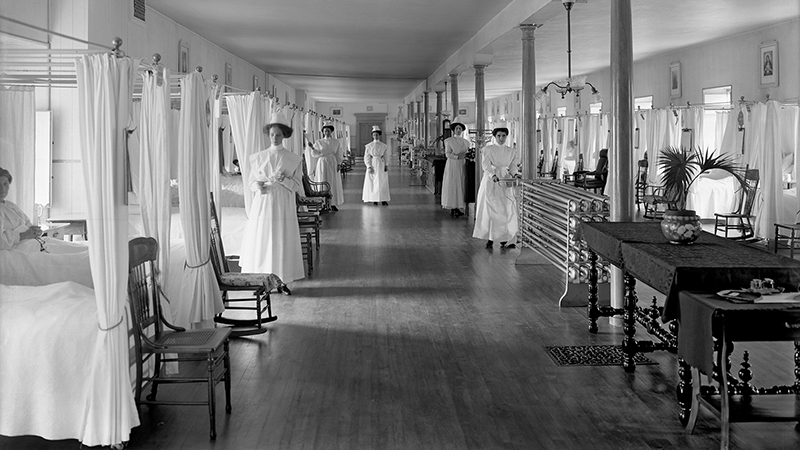The First Canadian Hospital: A Legacy of Care and Innovation
- Home
- The First Canadian Hospital: A Legacy of Care and Innovation

The First Canadian Hospital: A Legacy of Care and Innovation
A notable institution developed in the center of New France’s former vast rugged lands which established the groundwork of Canada’s healthcare system. The Hôtel-Dieu de Québec existed beyond its medical function starting from 1639 because it represented hope and resilience along with a steadfast dedication to healing. The creation of this hospital during an era with basic medical technology and harsh living conditions represented a major development in Canadian medical history.
Three Augustinian nuns from France launched the Hôtel-Dieu de Québec through their relentless dedication. The Augustinian nuns Marie Guenet de Saint-Ignace along with Anne Le Cointre de Saint-Bernard and Marie Forestier de Saint-Bonaventure-de-Jésus undertook a dangerous Atlantic crossing to deliver medical assistance to residents of the new colony. The journey of the Augustinian nuns represented a shift from structured European medical practices to the unforeseen challenges of Canada’s natural landscape.
A French noblewoman named Duchess d’Aiguillon supported the mission by funding the hospital’s creation. Her vision took shape from her uncle Cardinal Richelieu’s humanitarian dedication and compassionate nature. The duchess held that hospitals were essential for European settlers while simultaneously serving Indigenous communities as a conduit for cultural connection through compassionate medical care.
The hospital was situated in Québec City to strategically support the expanding colony. Hôtel-Dieu faced severe difficulties during its early days because of extreme winter conditions and medical supply shortages which led to disease outbreaks endangering both European settlers and Indigenous communities. The nuns maintained their mission through the creation of unique healthcare methods that combined European medical science with Indigenous healing traditions. Through intercultural collaboration the hospital refined its medical practices while establishing holistic healthcare standards throughout Canada.
As time passed the hospital improved and grew through additional facilities and services. Stone buildings replaced the original wooden structure which solidified the hospital’s permanent place in Québec City’s landscape. Despite modern hospitals leading medical advancements today, Hôtel-Dieu continues to uphold its importance by offering healthcare education and serving the community.
The Hôtel-Dieu differed from other early North American hospitals through several unique characteristics. Hôtel-Dieu de Québec emerged as one of the earliest medical facilities north of Mexico before many famous medical institutions were established. Hôtel-Dieu functioned differently from European hospitals by serving settlers and Indigenous peoples while also healing wounded soldiers from French-British conflicts. The hospital’s inclusive approach mirrored its wide-reaching humanitarian goals while establishing itself as a landmark of medical advancement and empathy.
The facility distinguished itself through its adoption of Indigenous healing techniques. The nuns acknowledged traditional Indigenous remedies as effective treatments and therefore adopted time-tested herbal treatments and healing techniques within their practice. The combination of multiple healing traditions led to the development of early integrative medicine practices before modern healthcare officially recognized the field.
Hôtel-Dieu served as more than a healing facility because it functioned as an educational establishment. The Augustinian nuns offered training programs for nurses and medical professionals which became one of Canada’s first formal medical education systems. Through their commitment to knowledge-sharing these institutions established the foundation for later nursing schools and medical colleges throughout the nation.
Hôtel-Dieu de Québec demonstrates remarkable endurance through centuries of wars and epidemics alongside numerous political changes. The hospital became a battleground during the British conquest of 1759 as part of the Seven Years’ War. The hospital served as a shelter where medical staff cared for injured soldiers from both French and British forces. The hospital maintained its original purpose of delivering medical assistance to everyone regardless of the new colonial rulers.
Epidemics were another formidable challenge. The colony experienced multiple epidemics of smallpox, typhoid, and influenza which frequently exceeded the hospital’s ability to manage patients. The nuns demonstrated unwavering dedication as they relied on both their medical expertise and spiritual beliefs to provide solace to those who suffered. Both the French-speaking community and British colonial administrators who governed Canada developed deep respect for their dedication.
Hôtel-Dieu now functions as a dedicated medical facility for specialized treatments. Even though it no longer operates as Québec City’s main hospital facility, its historic structures now function as healthcare and research centers which preserve its tradition of medical excellence.
Canada holds one of the finest healthcare systems globally with modern hospitals and advanced technology yet remains profoundly connected to its medical history through the enduring legacy of Hôtel-Dieu de Québec. Healthcare extends beyond medical treatments to encompass compassion alongside resilience and community services. The Augustinian nuns who journeyed across the ocean in 1639 could not have foreseen the extensive medical network emerging from their modest origins yet their foresight established one of Canada’s most valued institutions.
The Monastère des Augustines museum and wellness center is located within Québec City’s historic hospital buildings where visitors can explore its exhibits today. The site honors the trailblazing dedication of women healers throughout history while providing visitors a chance to explore the origins of Canadian healthcare and its lasting principles of care and humanity.
It remains crucial to recognize the foundational institution as we honor Canada’s progress in medical and public health achievements. Hôtel-Dieu de Québec exemplifies how perseverance and faith can create a lasting dedication to helping others beyond its function as a hospital. Our understanding of modern medical institutions becomes more profound when we recognize their foundation on centuries of dedicated sacrifice.
The first Canadian hospital served both as a treatment center and a groundbreaking model which established medical standards for subsequent institutions.
- Share
Magazica
Magazica is a dedicated platform for businesses, subject matter experts, health advocates, and various sectors within the health industry. At Magazica, we are committed to sharing the latest health information and developments with our audience. We serve as a gateway for health-related businesses to showcase their progress and advancements, demonstrating how they contribute to enhancing people's wellness.
